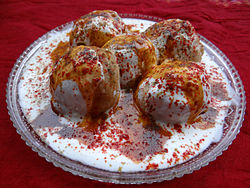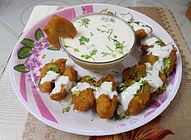Dahi vada
This article needs additional citations for verification. (August 2016) |
 Dahi vada | |
| Type | Chaat |
|---|---|
| Place of origin | Indian subcontinent |
| Region or state | Indian subcontinent |
| Main ingredients | Vada, dahi (yogurt) |
| Variations | Rajasthani Dahi Bada, Delhi Dahi Bhalla, Odia dahi bara[citation needed] |
Dahi Vada is a snack originating from the Indian subcontinent and popular throughout South Asia.[1] It is prepared by soaking vadas (fried flour balls) in thick dahi (yogurt).[2]
Names
Dahi Vada is also known as “dahi baray” ( دہی بڑے) in Urdu, "dahi bhalla in Punjabi, thayir vadai in Tamil,[3] thairu vada in Malayalam, perugu vada in Telugu, mosaru vade in Kannada, dahi bara (ଦହି ବରା) in Odia and doi bora (দই বড়া) in Bengali.
History
A recipe for dahi wada (as kshiravata) is mentioned in Manasollasa, a 12th-century Sanskrit encyclopedia compiled by Someshvara III, who ruled from present-day Karnataka.[4]
Preparation
Washed Urad lentils are soaked overnight and ground into a batter for the vada, then cooked in hot oil. The hot deep fried vadas are first put in water and then transferred to thick beaten yogurt. The vadas are soaked for a period of time before serving. Additions to the batter may include golden raisins. Vadas may be topped with coriander or mint leaves, chili powder, crushed black pepper, chaat masala, cumin, shredded coconut, green chilis, boondi, thinly sliced fresh ginger or pomegranate. Sweeter curd is preferred in some places in India, especially in Maharashtra and Gujarat, although the garnishing remains the same. A combination of coriander and tamarind chutneys is often used as garnish.
See also
References
- ^ "Soft, crisp vadas!".
- ^ "Express Recipes: How to make the perfect Dahi Vada".
- ^ "சோள தயிர் வடை /கார்ன் தஹி வடா".
- ^ K.T. Achaya (2003). The Story of Our Food. Universities Press. p. 85. ISBN 978-81-7371-293-7.





